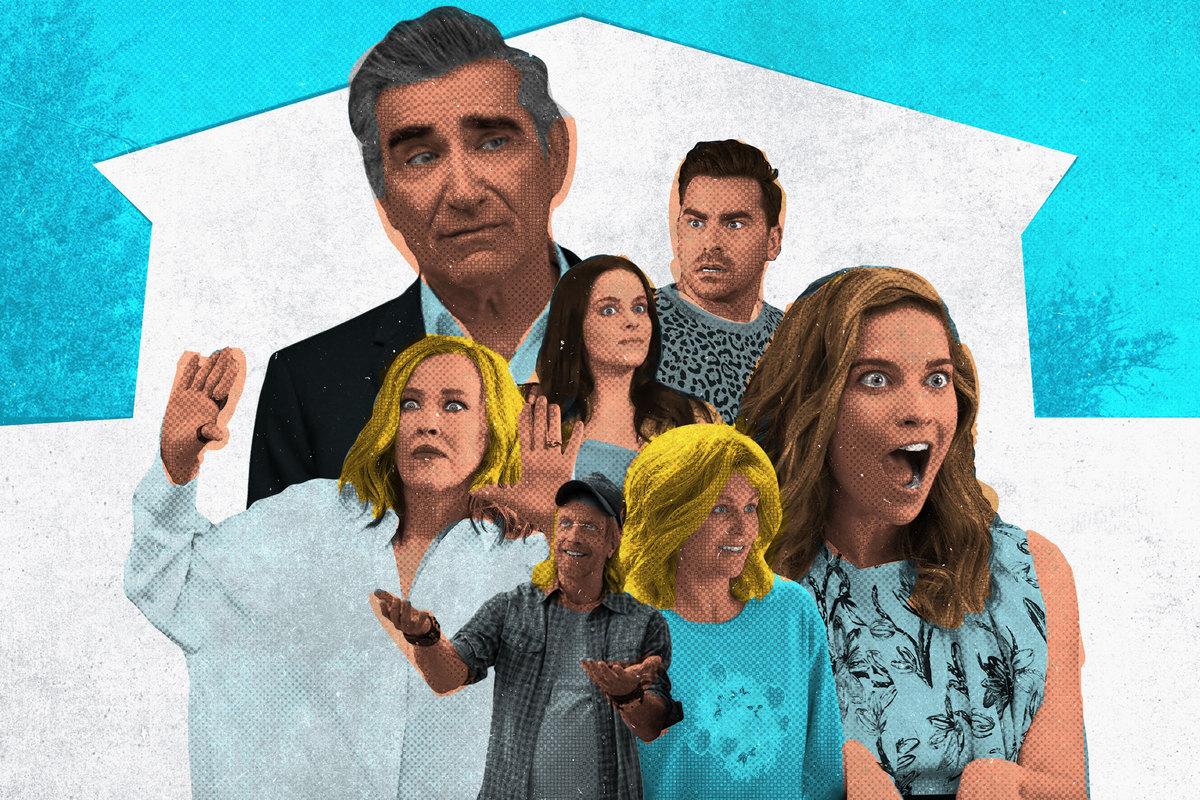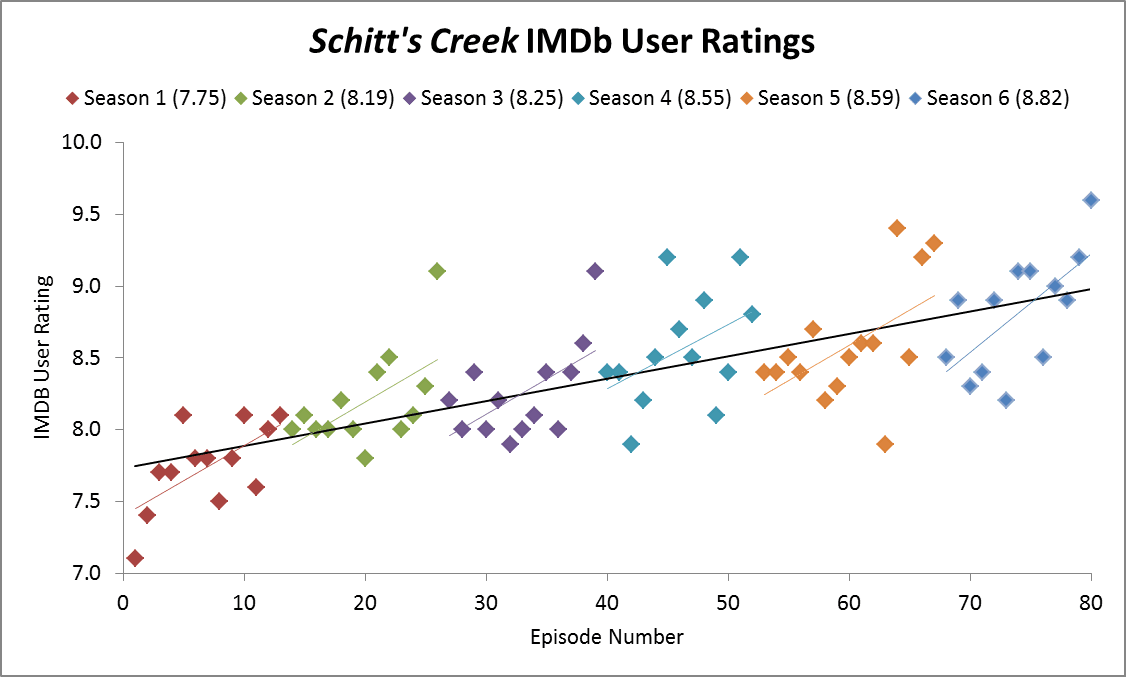
In the first episode of Schitt’s Creek, which aired in early 2015, newly destitute video-rental tycoon Johnny Rose (Eugene Levy) and his actress wife Moira (Catherine O’Hara) enter a shabby motel room in the series’ titular town. “Smells like a gym bag,” Johnny says. Five years and five-plus seasons later, in the penultimate episode of the series, Johnny and Moira exit the same motel room for one of the last times, and Moira observes that the air smells like lavender. “Isn’t it funny how the air suddenly smells sweeter now that you know we’re leaving?” Johnny asks.
New episodes of Schitt’s Creek, which will conclude its run on Tuesday on CBC TV in Canada and Pop TV in the U.S., have seemed sweeter since its fans learned it would be leaving. Series cocreator/star Dan Levy—Eugene’s real-life son, and Johnny’s on-screen son David—announced last March that the show would be ending this year after six seasons, much to its audience’s dismay. When viewers met them in the first episode, the Roses regarded Schitt’s Creek as hell. (“Apparently in hell, there’s no bellman,” Moira remarked upon arriving at the motel.) By the final episode, they think of it as home. Over the same span, the series has also served as a sanctuary for the millions of fans who’ve flocked to its fictional town for 22 minutes at a time.
Schitt’s Creek, a cocreation of Dan and Eugene, is the rare TV series that will wrap production not by necessity, but by choice, retiring at the peak of its appeal and popularity. The series’ audience has progressively grown, a product of positive word of mouth, Pop TV’s marketing, and, perhaps most important, its appearance on Netflix after its first two seasons. Further buoyed by four Emmy nominations last year, viewership on Pop is up 60 percent since Season 5, and according to a Nielsen streaming report, Schitt’s Creek trailed only The Office in viewership among non-original series on Netflix in the first week of March.
The late adopters who discovered Schitt’s Creek during its run had the pleasure of catching up to a comedy that never lost its touch. “I at no point wanted to compromise on quality or storytelling,” Dan Levy recently said of the decision to end the series. “It just didn’t feel like it was worth the risk to take it any further.” By avoiding a decline for six seasons, the series had already flouted TV trends. In contrast to the typical sitcom, which tends to peak in perceived quality roughly halfway through its run, Schitt’s Creek hit its sweet spot fairly early on and kept improving, posting a higher average IMDb user rating with each successive season.

Schitt’s Creek is the story of the Roses, who lose their fortune and their mansion because of an embezzling business manager and take refuge in an asset so seemingly worthless that the government declines to confiscate it—the unassuming small town of Schitt’s Creek, which Johnny purchased decades earlier solely so he could give the deed to David as a gag gift. In the first episode, we get a glimpse of their lavish life as they pack a few personal possessions. The next time we see them, they’ve reluctantly relocated to the tiny, ignobly named town. They move into two adjoining motel rooms, where they lament their loss in social status, clash with the locals, and, eventually, start repairing broken relationships, forging fresh ones, and searching for a purpose beyond pining for their former lives.
The show is, first and foremost, funny. The top of the call sheet combines two Canadian comedy legends and two perfectly cast colleagues who were relative unknowns when the series started. Each of the Roses—including David’s socialite sister Alexis (Annie Murphy)—brings something essential to the comedic mix: Moira’s odd diction, expansive vocabulary, and flamboyant wardrobe and wig collection; David’s equally eye-catching outfits, biting commentary, and extreme expressions; Alexis’s flouncing and preening movements, perpetually limp-wristed hands, and self-pitying petulance; Johnny’s immaculate suits, straight-man stolidity, and oft-arched eyebrows. Although the Roses and hotel manager Stevie (Emily Hampshire) get most of the laugh lines, the town features several reliable sources of comic relief, among them grimy mayor and ball-buster Roland (Chris Elliott), plucky teacher and a capella group leader Jocelyn (Jennifer Robertson), clean-cut Ted (Dustin Milligan), slouching garage owner Bob (John Hemphill), and indefatigable waitress Twyla (played by a third Levy, Eugene’s daughter Sarah).
Schitt’s Creek’s recurring bits are made to be memed, GIFed, and compiled: Alexis saying “Ew” and “David” and casually recounting her exotic misadventures; David uttering exasperated “Oh my Gods”; Moira, the series’ breakout character, unabashedly saying “bébé.” The series has generated its share of viral clips, like Moira’s iconic commercial for fruit wine or Alexis’s much-imitated rendition of “A Little Bit Alexis,” but so many more minor moments are stuck in my mind. I’ve watched the following understated snippet from the Season 5 finale dozens of times, delighting in David’s shoulder shimmy and smile (preceded by Dan Levy laughing at his own over-the-top entrance).
At the beginning of the series, the Roses were unpleasant people ripped from reality TV: arrogant, narcissistic, and snooty. They were almost strangers to each other, as well as to their new neighbors. The comedy came from the contrast between the intensely entitled, highly mannered Roses and their unpretentious surroundings. The series had a heart, but it wasn’t often on display.
Like a lot of cult or classic series, Schitt’s Creek gradually revealed layers that weren’t immediately apparent from its fairly familiar fish-out-of-water premise. The Office writer/producer and Parks and Recreation creator Michael Schur explained last week how both of those series pivoted toward kindness in unexpected ways: Michael Scott diverged from U.K. model David Brent after The 40-Year-Old Virgin showcased the warmth of Steve Carell, and Leslie Knope, prompted by Amy Poehler’s portrayal, evolved from a polished politician into a more relatable, sympathetic figure. Schitt’s Creek is a family affair both behind and in front of the camera, and its pivot was planned from the start.
“The setup of the show,” Levy told Variety, “was always that this family would realize that money is not the be all and end all. … The goal was at the end of this show, this family will realize the value of love.” It took time to make that transformation convincing. “Strategically speaking, we needed these people to have a season of being themselves—or who they thought they were—in order to earn the subsequent seasons, and the growth of these characters,” Levy continued. By the end of Season 2, the Roses were capable of declaring their mutual love and dancing deep into the night, comfortable in a barn that they once would have hesitated to enter.
That alcohol-aided display of affection doesn’t come naturally to the series’ core quintet. The Roses and Stevie are averse to sentimentality, a habit that they haven’t entirely broken by the end of the series. That tendency prevents the series from tipping too far into treacly territory, even as it nears its emotional end.
In the teary—or, as the sesquipedalian Moira might say, lachrymose—second-to-last episode, “Start Spreading the News,” humor comes close on the heels of the most melodramatic moments. In the cold open, Johnny, Moira, David, and Alexis pose for a family selfie. “Ah, now that’s a framer,” Johnny says with satisfaction. Then he accidentally deletes the shot, turning a touching moment into comic relief. Later in the episode, David and Stevie, who’s become his best friend, have a heart-to-heart in which David decides to stay in Schitt’s Creek rather than return to New York. As David leans on Stevie’s shoulder, overcome by finally feeling at home, he can’t stop himself from sobbing, “Did you put on deodorant today?”
In a subsequent scene, the Roses assemble for a family pizza night at the motel. “I could not be more proud of my family than I am right now,” Johnny says. “And as much as I’ll miss this, being together, at least I can go to sleep knowing we’re all gonna be OK.” Seconds later, Moira mentions that she’s planning to leave town on September 3—the date of David’s wedding. Informed that she failed to save the date, she asks delicately, “And we’re tied to the third?” She agrees to delay her departure until the following morning, but not without noting that she’ll have to forgo flying in a lie-flat seat.
In the last scene of the episode, David surprises Patrick, his fiancé, with the news that he’s made an offer on a house for the two of them. Patrick is touched, and the two share a kiss, but then the more practical part of Patrick’s brain kicks in. “Wait, so when you say you put an offer in, what exactly did you do?” he asks. David concedes that he doesn’t know; he may have started a small business, but he still has many life skills left to learn.
Sometimes, Schitt’s Creek pushes past its impulse to deflect tender moments with comedy. Earlier in the episode, Moira breaks up a group hug, exclaiming, “Oh no, let’s not turn this into a Hallmark movie of the week. I’ve done enough of those for a lifetime.” Then she fights her first impulse and relents, allowing, “Well, maybe just a quick one.” The exchange between David and Patrick could have ended with a laugh line, but instead, the camera lingers, capturing the couple’s smiles and wordless hug. Unlike a lot of sitcoms that cram in punch lines and implausibly rapid repartee, Schitt’s Creek is at ease with silence, content to let its characters’ expressions speak for themselves.
The series doesn’t have to telegraph the meaning of those moments because it’s so clear that the characters have come a long way, both on their own and in relation to each other. Although Schitt’s Creek is most commonly classified as a sitcom, Levy told Variety that he and his dad consider it a drama “that happens to involve very funny circumstances, and characters that are not equipped to handle those circumstances.”
Whereas many sitcoms strand their characters in a developmental void, subjecting them to similar scenarios and eliciting similar reactions season after season, Schitt’s Creek’s characters grow. Every arc is satisfying and logically laid out. Johnny and Moira regain control of their careers, but they also learn to care for their kids and the town and at least partly let go of their upper-class airs. David makes a genuine friend, founds a business, and meets his husband. Alexis, who starts the series hoping to be rescued by a boyfriend who doesn’t care about her, finds real love but also goes back to school and ultimately opts to pursue her own career rather than follow someone else’s dream or accept financial support. Shy, laconic Stevie accepts the elder Roses as mentors and blossoms into an actress and entrepreneur.
By incorporating non-heterosexual romance in a sensitive but straightforward way—and, through its Season 6 marketing campaign, putting a gay kiss on billboards across the continent—Schitt’s Creek also became a beacon for the queer community. Schitt’s Creek may lack modern amenities, as a deflated David learns when he looks for a business center in the first episode, but the town also largely lacks prejudice. The younger Levy, who came out as gay at 18, chose to present a relationship free of homophobia as a model for what real-life relationships could and should look like. Whereas queer characters on other shows might have to overcome the objections of family or friends in order to get together, the only obstacle to the love between David and Patrick is their own insecurity. On Schitt’s Creek, characters strive for openness, sincerity, and self-acceptance. As David, who’s pansexual on the show, matter-of-factly explains to Stevie (and Hampshire, who’s pansexual in real life), “I like the wine and not the label.”
Most episodes of Schitt’s Creek start with an exterior view of the motel, accompanied by the soothing sound of birds chirping and cicadas singing. Those establishing shots instantly transport the viewer to the fairty-tale town, where it’s almost always summer and sunny (aside from a one-off Christmas special). Over six seasons, the series trained its TV visitors to “see and hear the beauty in the bucolic.” Schitt’s Creek was filmed in Ontario, and Dan Levy has hinted that in his head, the series is set in Canada. In the show, though, the town’s location is deliberately left vague. It’s an aspirational setting, one we can all picture placing ourselves in.
In a less special series, the entire Rose family would settle down in their adopted town, rejecting the trappings of fame and fortune in favor of a wholesome, small-town existence. In this series, David does stay, but the rest of the Roses scatter: Alexis to New York, and Johnny and Moira to California. Although they’re physically separated, they’re much more closely connected than they were when they first occupied adjacent rooms at the motel. “It’s gonna be a tough goodbye,” Patrick tells David in “Start Spreading the News.” In the end, though, he and David don’t leave. Neither will we: As long as Schitt’s Creek is still streaming, we can stop by anytime.

